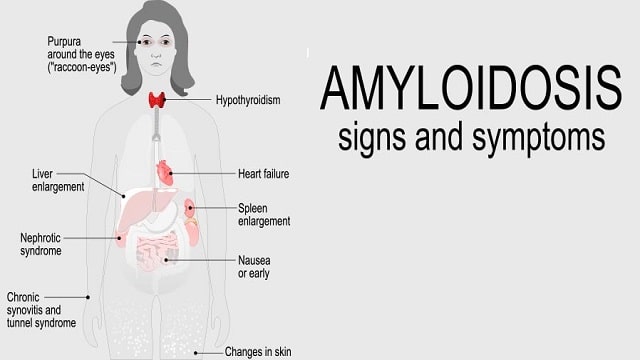Amyloidosis is a condition that occurs when an abnormal protein called amyloid builds up and forms deposits. Amyloid is a type of protein fibril in the body. Normal amyloid plays an important role in the body’s physiological activities, such as forming long-term memory and releasing peptide hormones.
In certain circumstances, amyloid can become abnormal, such as in conditions where the protein aggregates are not positioned correctly, known as pathogenic amyloid. This condition can cause accumulation in various tissues in the body and disrupt the normal function of these tissues.
Symptoms of Amyloidosis
Amyloidosis is a disease that generally does not cause any symptoms in the early stages. However, symptoms will arise in various ways in sufferers when the disease has progressed to a more advanced stage, depending on where the pathogenic amyloid protein accumulates. The following are common signs and symptoms that can occur in sufferers of amyloidosis, including:
- Severe headache.
- Joint pain.
- Changes in skin color.
- Anemia.
- Tingling or numb feet.
- Can’t grip firmly.
- Drastic weight loss.
- No appetite.
- Nauseous.
- Diarrhea.
- Stomach ache.
- There is a disturbance in balance.
- Sweating disorder.
Causes of Amyloidosis
There are many mechanisms of protein function that may cause amyloidosis. For example, such as incorrect protein breakdown, mutations in proteins, and other processes that have not been explained. This condition then forms abnormal, non-functional protein fibrils and accumulates in the tissue which then causes disorders to failure of function in the tissue.
This condition is divided into two, namely systemic and localized. There are various types, including:
- AL Amyloidosis (Immunoglobulin Light Chain)
The most common type. AL amyloidosis is caused by abnormal white blood cells, namely plasma cells in the bone marrow associated with multiple myeloma disease.
- ATTR Amyloidosis
It is a hereditary condition. ATTR amyloidosis is caused by mutations in the transthyretin (TTR) gene.
- AA Amyloidosis
Derived from the inflammatory protein amyloid A. Typically, this condition is associated with chronic inflammatory diseases, such as rheumatic diseases, familial Mediterranean fever, chronic inflammatory bowel disease, and tuberculosis or empyema.
- Beta2-Microglobulin Dialysis Amyloidosis-Associated (ABM2)
It is a systemic type that occurs in kidney failure patients undergoing long-term dialysis. ABM2 amyloidosis can normally be removed by the kidneys.
Amyloidosis Risk Factors
Although anyone can experience amyloidosis, certain factors increase a person’s risk of developing it, namely:
- Male gender.
- Aged 60–70 years.
- Having multiple myeloma.
- Having a family history of amyloidosis.
- Undergoing dialysis for a long period of time due to kidney damage.
Diagnosis of Amyloidosis
The diagnosis of amyloidosis is based on the results of interviews, physical examinations, and confirmed by other supporting examinations. For example, blood tests, urine tests, and pathological anatomical examinations with Congo Red staining and immunohistochemistry with biopsy sampling.
The biopsy sampling sites for systemic amyloidosis are the abdominal fat layer and rectal mucosa. In addition, imaging studies can also help diagnose amyloid deposits. Cardiac amyloidosis can be seen using magnetic resonance imaging (MRI), echocardiogram, and technetium pyrophosphate scintigraphy.
Complications of Amyloidosis
If not treated immediately, amyloidosis can cause serious complications, namely:
- Cardiac (Heart) amyloidosis
Amyloidosis can cause the muscles in the heart wall to become stiff. In addition, this condition can also cause the amount of blood in the heart to decrease.
- Kidney or Renal (Kidney) amyloidosis
Untreated amyloidosis can damage the kidneys’ filtering system, causing proteins to leak from the blood into the urine. As a result, the kidneys’ ability to remove waste products from the body decreases. This can eventually lead to kidney failure and the need for dialysis.
- Nerve Damage or Amyloid Neuropathy
Amyloidosis can affect nerve function due to amyloid deposits in certain nerves. For example, if amyloid affects the nerves that control bowel function, the sufferer may experience alternating periods of constipation and diarrhea.
Meanwhile, if amyloid affects the nerves that control blood pressure, sufferers may easily faint after standing up too quickly.
Amyloidosis Treatment
Amyloidosis cannot be cured, but sufferers can slow the progression of the disease and reduce its symptoms. The treatment method given will also depend on the type of amyloidosis in the sufferer. The following is a description, including:
- AL Amyloidosis
In the case of AL amyloidosis, chemotherapy aims to destroy abnormal blood cells that produce amyloid protein. In addition, AL amyloidosis treatment can also be done with the use of drugs. Examples include proteasome inhibitors and immunomodulatory drugs.
- AA amyloidosis
The type of AA amyloidosis will be treated based on the cause. If caused by a bacterial infection, then amyloidosis will be treated with antibiotics. Inflammatory conditions are treated with medications to reduce inflammation.
- Beta2-Microglobulin Dialysis Amyloidosis-Associated (ABM2)
Dialysis amyloidosis can be treated by changing the type of dialysis the sufferer receives. In addition, another option for this treatment is to have a kidney transplant.
- ATTR Amyloidosis
People with ATTR amyloidosis need a liver transplant because this type of amyloidosis is hereditary. It is important to note that the abnormal protein that causes this type of ATTR amyloidosis is produced in the liver.
Prevention of Amyloidosis
There is no effective method to prevent amyloidosis. However, always maintaining kidney health can reduce the risk of developing dialysis-related amyloidosis. Some efforts that can be made to maintain kidney health:
- Fulfill your body’s fluid needs (2 – 3 liters of water per day)
- Exercise regularly.
- Maintain weight.
- Avoid alcohol consumption.
- Do not smoke.
- Control blood pressure.
When to See a Doctor?
Amyloidosis symptoms will vary so that sufferers often do not realize that the complaints they feel are symptoms of the disease. Therefore, it is important to immediately see a doctor if you experience one or more common symptoms of amyloidosis. Especially if the symptoms you feel do not improve.

